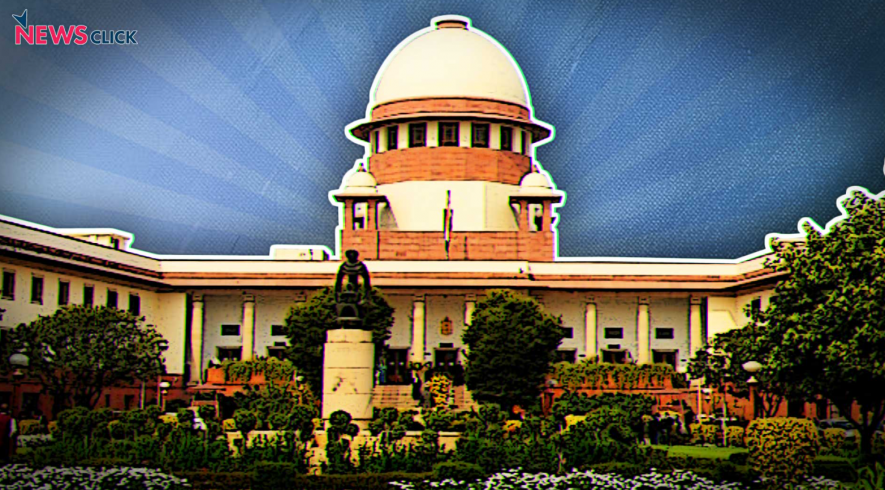SC Questions ‘Selective Remission’ for 11 Bilkis Bano Convicts

The Supreme Court (SC) questioned the Gujarat government’s “selective” remission policy in the premature release of the 11 convicts who gang-raped Bilkis Bano during the 2022 Godhra riots on Thursday and warned that it is on “thin ice”.
“Why is the policy of remission being applied selectively and How far is this law being applied to inmates in jail? Why are our jails overcrowded? Particularly with undertrials?” Justice BV Nagarthna asked while hearing a series of petitions on the untimely release of the men, who raped Bano and killed her family, on last year’s Independence Day.
A Bench of Justices Nagarathna and Ujjal Bhuyan asked the question when the Gujarat government, supporting the 11 men’s release, asked that shouldn’t a person convicted of a heinous crime be given the chance to reform himself, LiveLaw reported.
“What is the purpose of remission?” additional solicitor general (ASG) SV Raju, appearing on behalf of the state government, asked. “Is the purpose of remission punishment? Does committing a heinous crime debar a convict from getting its benefit even if the convict has reformed himself, has displayed remorse and wants to start a new life again? Should the past always be dangling above your head? Should these convicts be condemned for all times to come? These are the questions.”
When the ASG argued that the completion of 14 or more years of rigorous imprisonment was sufficient deterrence and “where the crime is punishable with the death penalty, and the court has handed out a life sentence, it is indicative of the fact that it was not such a heinous crime and not the rarest of rare case”, Justice Nagarathna clarified, “It was held to be heinous but not the rarest of rare.”
GUJARAT GOVERNMENT SUPPORTS REMISSION
Arguing that there is a scope for reformation when the ‘rarest of rare’ doctrine has not been applied to sentence a convict to die, Raju further argued, “Where it is not the rarest of rare case, surely a convict should be given the chance to reform themselves. They may have committed an offence at the moment but may have later realised their consequences later.”
Supporting the premature release, the ASG further argued, “Whether the convict has realised the consequences can be determined on the basis of their conduct in jail or when they are released on parole or furlough—all these factors show that the convict has now realised what they did was wrong.”
Contending that the “law does not say that every convict should be hanged or even punished perpetually,” Raju asserted, “The law speaks about giving a chance to even the most hardened criminal to reform themselves.”
Nagarathna interjected to ask, “How far is this law being applied to inmates in jail? Why are our jails overcrowded- particularly with undertrials? Why is the policy of remission being applied selectively?”
Admitting that it would be difficult for him to answer, Raju said, “On the basis of the facts of a case, I may be able to answer. You will have to have the statistics. The state-wise statistics. The opportunity to reform should be given to every prisoner. Not only to a few prisoners. I am told that this case is going on in the second court [by a bench headed by Justice Sanjay Kishan Kaul]. Some guidelines are being framed. All states are going to answer.”
When senior advocate Siddharth Luthra said that the moment a convict completes 14 years, he has “to prove his case for premature release”, Justice Nagarathna asked again, “But how far is the remission policy being implemented in cases where convicts have completed 14 years? Is remission policy being implemented in all such cases subject, of course, to their eligibility?”
Illustrating her point with reference to the famous Rudul Shah case, in which a writ petition seeking compensation was filed by a prisoner who was illegally detained in jail for more than 14 years despite being acquitted by a trial court in the murder of his wife, Justice Nagarathna said, “On the other hand, you have cases like Rudul Shah. Even though there was an acquittal, he continued to remain in prison. Extreme cases— both this side and that side.”
REMISSION POLICY
Raju argued that the court that convicted the 11 men and the one that confirmed their conviction and sentence were aware of the remission policy that would allow their premature release subject to the fulfilment of other criteria.
“The consideration of the courts should also be understood by referring to the contents of the judgment and the sentence imposed. The fact that the courts did not award more strenuous imprisonment leads to the inference that the court was possible, and in my submission, definitely of the view that the convicts would benefit from the 1992 policy. This shows the mind of the courts.”
Trying to convince the Bench that the concurrent sentence handed to the convicts was telling of the court’s view on them getting the benefit of a remission policy, he said, “The ordinary rule is a concurrent sentence, but courts have been known to award consecutive sentences as well. Therefore, the court was not so carried away by the fact that these offences were so heinous that they required consecutive sentences.”
However, Justice Nagarathna again interjected, “Here, the highest punishment is awarded after the death penalty. When life imprisonment is awarded, it has to be concurrent. It cannot be consecutive. There is only one life … hopefully.”
When Raju said that “the court could have said that the second sentence would continue after remission in the first, but this was not done in this case”, Justice Nagarathna asked, “So, you are saying that since no period was specified and their sentences were of life imprisonment simpliciter without any qualification, virtually they have the right to come out after 14 years?”
The ASG tried to explain his point further. “Because of the policy, they have the right to be considered. And if the opinion is favourable, they would be released at the State’s discretion. The issue is whether the State has exercised its discretion correctly.”
Asserting that the Gujarat government has complied with all requirements under the law when granting remission, Raju said that the State was “duty bound” to follow the remission policy applicable in 1992 across Gujarat due to the operation of the specific mandamus issued by the top court in the Radheshyam Shah (2022) case, in which the SC had ordered that the remission application had to be decided by the Gujarat government in terms of that policy.
Arguing that Justice Nagarathna-headed Bench disagreed with his conclusion, Raju said that it would not result in the reversal of the order. “It cannot be reversed in a collateral proceeding. Right or wrong, such an order can only be reversed in an appeal, review or recall. Disagreement would not have the effect of reversal. The effect will be for future use, it may be termed as per incuriam. Or, it may be overruled by a larger Bench. A judgement which is overruled but not reversed is still binding on the parties.”
Raju also said that “it is too late” for the petitioners to contend that the remission policy notified by the Gujarat government in 2014 should apply instead of the 1992 policy that the SC held to be applicable. “They have missed the bus.”
OPINION OF PRESIDING JUDGE
Relying on the recent SC ruling in the case of Enforcement Directorate chief SK Mishra’s extensions for non-compliance with a mandamus issued by the court in its 2021 Common Cause judgement, the ASG said, “If a specific mandamus cannot be overturned by legislation, surely it cannot be overturned by a judgement of this court.”
The Gujarat government had also complied with the requirement to seek a judicial opinion as mandated under sub-section (2) of Section 432 of the Code of Criminal Procedure, Raju added. He argued that the positive opinion of the district judge at Godhra, a member of the jail advisory committee that okayed the premature release of the 11 convicts, was “sufficient compliance”.
“In this case, the sessions Judge who passed the conviction order retired. Even two Judges of the High Court that confirmed the convictions retired.”
However, Justice Nagarathna pointed out that the opinion of the presiding Judge of the court, not the specific case, was sought under the section. “The institution remains. This section says that the opinion of the presiding Judge of the court, and not the case, has to be considered. Every three years, Judges are transferred.”
GUJARAT GOVERNMENT ON ‘THIN ICE’
When Raju argued that owing to the nature of the case, it was not required to consult the CBI, which had taken over the probe into this case, Justice Nagarathna cautioned, “All said and done, it was investigated by the CBI. There’s no dispute. You are on thin ice. To discuss whether CBI needed to be consulted is also academic. There was consultation … What opinion did the agency give?”
When Raju said that the CBI gave a negative opinion, Justice Nagarathna asked, “In all cases?” Raju replied, “Yes” but contended that the CBI’s opinions revealed “no application of mind. They just narrate facts. Except for stating offence was heinous, nothing is mentioned. That is why, my first submission about which Your Ladyship said. ‘I was on thin ice’, is relevant. An officer sitting in Mumbai has no knowledge of ground reality.”
When Justice Bhuyan asked, “How will you come to know about ground reality?”, Raju argued that a police officer or a Judge would be most competent with respect to cases within their jurisdiction.
However, Justice Nagarathna , however, pointed out that the consideration of jurisdiction was not given precedence when the proceedings were transferred out of Gujarat to ensure a free and fair trial. “Keep the background of the case in mind. The trial was sent to another state outside the jurisdiction.”
The next hearing will be held on August 24.
Get the latest reports & analysis with people's perspective on Protests, movements & deep analytical videos, discussions of the current affairs in your Telegram app. Subscribe to NewsClick's Telegram channel & get Real-Time updates on stories, as they get published on our website.
























